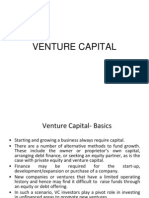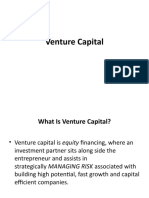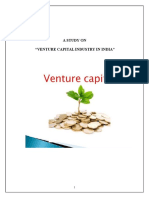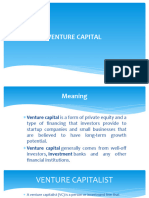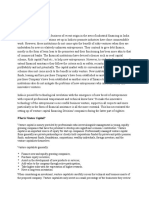0% found this document useful (0 votes)
22 views5 pagesWhat Is Venture Capital
Venture Capital is a form of investment where wealthy individuals and institutions provide funding to startups and small businesses with high growth potential, typically during early stages. Venture capital firms manage these investments, pooling capital from various sources to support multiple startups, while venture capitalists are the investors who provide the necessary capital. The venture capital landscape in India has evolved significantly since the late 1980s, with regulatory frameworks established to guide investments and promote growth in the sector.
Uploaded by
mansee manralCopyright
© © All Rights Reserved
We take content rights seriously. If you suspect this is your content, claim it here.
Available Formats
Download as DOCX, PDF, TXT or read online on Scribd
0% found this document useful (0 votes)
22 views5 pagesWhat Is Venture Capital
Venture Capital is a form of investment where wealthy individuals and institutions provide funding to startups and small businesses with high growth potential, typically during early stages. Venture capital firms manage these investments, pooling capital from various sources to support multiple startups, while venture capitalists are the investors who provide the necessary capital. The venture capital landscape in India has evolved significantly since the late 1980s, with regulatory frameworks established to guide investments and promote growth in the sector.
Uploaded by
mansee manralCopyright
© © All Rights Reserved
We take content rights seriously. If you suspect this is your content, claim it here.
Available Formats
Download as DOCX, PDF, TXT or read online on Scribd
/ 5



